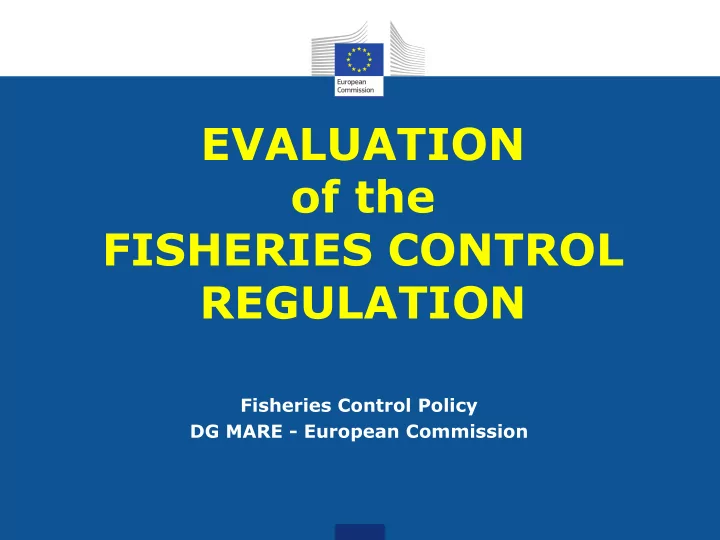

EVALUATION of the FISHERIES CONTROL REGULATION Fisheries Control Policy DG MARE - European Commission
Regulation (EC) 1224/2009 establishing a Union control system for ensuring compliance with the rules of the common fisheries policy Objective Implement a sufficiently specified and uniform policy for the control system of Member States fishing activities in order to ensure the effective implementation of the CFP rules, for assuring sustainable exploitation of living aquatic resources, and reduction of overcapacity
Why an evaluation? 5 years report from the Member States to the Control Commission on the application of the Regulation Regulation (art. 118(1) & Report from the Commission to the European art. 118(2)) Parliament and the Council on implementation Control Evaluation of the impact of the Regulation on Regulation the common fisheries policy 5 years after the entry (art. 118(3)) into force REFIT Assessment of whether the Regulation is fit for (SWD(2015)110 purpose by focusing on simplification and p. 124 regulatory burden reduction aspects 3
Stakeholders consultation ➢ 5 Year Reports from Member States ➢ National visits to Member States ➢ External study (consultant) ➢ Public consultation December 2015-March 2016 ➢ Workshop with Advisory Councils, NGOs and industry associations ➢ Workshop with the European Parliament ➢ Commission's appreciations (results from Commission audits, verification missions, inspections) 4
Results of the evaluation Implementation: rather (but not fully) positive MSs have generally implemented the main provisions Impacts: positive • Improvement of behaviours and compliance with CFP rules • Increase level playing field among operators • Increase quality of catch data • More collaboration among Mss • Simplification of the legislative framework • Decrease in administrative burden • Appreciation of the EFCA 5
Results of the evaluation ❖ Relevant to promote culture of compliance with the CFP ❖ Add EU value in increasing level playing field among operators and Member States ❖ Coherent with other fisheries legislation and other policies, but synergies should be increased (e.g. CFP – LO, MSF) ❖ Effective and efficient : positive role of VMS, ERS, Risk analysis, SCIPs/JDPs, inspection standards, training. Deficiences in sanctions and point system, control and reporting of small vessels, traceability ❖ Administrative burden decreased 6
DISCUSSION 7
PROMOTION OF THE LEVEL PLAYING FIELD 8
Assessment Appropriateness of Implementation provisions in CR VMS ERS Inter-operability issues (data exchange between MSs) Vessels 12-15m Derogations undermine Difficulties in data level playing field exchange between MSs Vessels <10m Exemptions undermine Difficult control level playing field Uncertainties on catch data 9
Assessment Appropriateness of Implementation provisions in CR Catch Data and Discrepancies Fishing Efforts between reported data Traceability Difficulties of inter- operability among MSs Difficulties in data verifications Recreational Lack of provisions No catch data Fisheries 10
DEVELOPMENT OF A CULTURE OF COMPLIANCE AND RESPECT OF THE COMMON FISHERIES POLICY RULES 11
Assessment Appropriateness of Implementation provisions in CR Risk management Not uniform application at EU level Differences in criteria applied SCIPs/JDPs Sanctions Serious national criteria infringements undermine level playing field 12
SIMPLIFICATION AND REDUCTION OF ADMINISTRATIVE BURDEN 13
Assessment Appropriateness of Implementation provisions in CR Simplification of the un-clarity of some regulatory provisions framework respect to previous system Reduction too many derogations administrative provided burden respect to previous system 14
Conclusions (+) MS have generally implemented the main provisions of the CR • (+) The CR has helped stepping up a culture of compliance with the CFP • (-) However there are a number of shortcomings : • 1. 1) Incomplete implementation of certain (key) rules ( e.g. sanctioning system). This would require additional effort from the MS • 2) The Regulation is not entirely fit for purpose This would require a revision of the legislative framework , which was beyond the scope of this evaluation 15
Next steps: address shortcomings ➢ Implementation: D4 work programme ➢ Legislative framework: launch of the revision Lack of aligmnent CFP Sanctions and point system Follow up of infringments Control and reporting catch data small vessels Data exchange and data sharing Rigidity of some provisions 16
Next steps for the revision: stakeholders consultation Council Working Party 26 April 2017 ➢ Comments received from DE and ES Expert Group on Fisheries Control 7 June 2017 ➢ EP PECHE committee 22 June 2017 ➢ Compliance Group on Fisheries Control 5 July 2017 ➢ Advisory Councils ➢ Public consultation on proposed options ➢ Take into account ECA Report EU fisheries controls: more efforts needed EP Report how to make fisheries uniform EFCA Recommendations stemming from its 5years evaluation 17
Th Thank nk you you fo for r you your att ttenti ention on 18
Recommend
More recommend